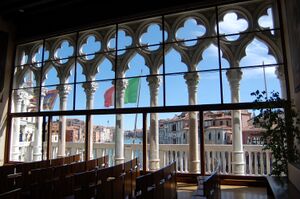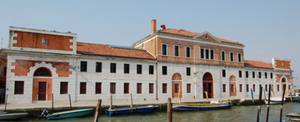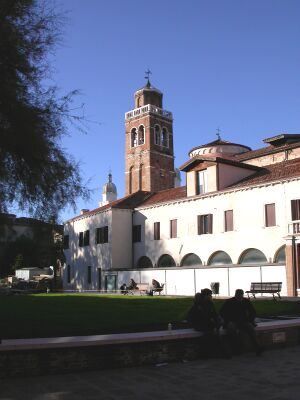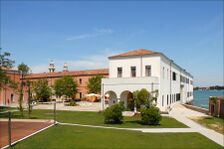Difference between revisions of "Ca' Foscari University of Venice"
m (Robin moved page University of Venice to Ca' Foscari University of Venice) |
(unstub) |
||
| Line 3: | Line 3: | ||
|constitutes=university | |constitutes=university | ||
|leaders= | |leaders= | ||
| − | |logo= | + | |logo=Logo Università Ca' Foscari Venezia.png |
|twitter= | |twitter= | ||
| − | |start= | + | |start=1868 |
|headquarters=Venice, Italy | |headquarters=Venice, Italy | ||
| + | |description=From the outset conceived as a national rather than a regional institution | ||
}} | }} | ||
| + | [[File:Ca' Foscari-Aula Baratto.jpg|thumb|Ca' Foscari-Aula Baratto]] | ||
| + | [[File:Università Ca' Foscari Venezia San Giobbe.png|thumb|San Giobbe Campus|alt=San Giobbe Campus]] | ||
| + | [[File:Università Ca' Foscari Venezia San Sebastiano.JPG|thumb|San Sebastiano Campus|alt=San Sebastiano Campus]] | ||
| + | '''Ca' Foscari University of Venice''' (''Università Ca' Foscari Venezia'') is a public university in [[Venice]], Italy; it is usually known simply as '''Università Ca' Foscari'''. Since its foundation in 1868 it has been housed in the [[Venetian Gothic architecture|Venetian Gothic]] palace of [[Ca' Foscari]], from which it takes its name. The palace stands on the [[Grand Canal of Venice|Grand Canal]], between the [[Rialto]] and [[San Marco di Venezia|San Marco]], in the [[sestiere]] of [[Dorsoduro]]. | ||
| + | |||
| + | The institute became a university in 1968. It currently has eight departments and almost 21,000 students. It is one of the highest ranked universities in Italy, ranking 5th in 2017 out of 89 universities.<ref>https://www.cafoscarialumni.it/news/ca-foscari-al-nono-posto-nel-ranking-del-sole-24-ore</ref><ref>https://www.sostudenti.it/universita/news/migliori-universita-economia-2017-2018-classifica-censis/</ref> | ||
| + | |||
| + | ==History== | ||
| + | The institution was founded as the Regia Scuola Superiore di Commercio ("royal high school of commerce") by a Royal Decree dated 6 August 1868, and teaching commenced in December of the same year. The idea of establishing such a school had arisen after the annexation of the [[Veneto]] to the new [[Kingdom of Italy]] in 1866, and was promoted by three people in particular: the Jewish [[Political economy|political economist]] [[Luigi Luzzatti]], later [[Prime Minister of Italy]]; Edoardo Deodati, [[Senate of the Republic (Italy)|senator]] of the Kingdom of Italy and vice-president of the [[province of Venice]]; and the Sicilian political economist [[Francesco Ferrara]], director of the school for its first thirty years. | ||
| + | |||
| + | The school was the first institute of higher education in [[commerce]] in Italy, and was from the outset conceived as a national rather than a regional institution; it had a diplomatic arm to prepare [[Commercial diplomacy|commercial consular staff]] for overseas service, and was also a [[teacher training college|training college]] for secondary school teachers of commercial subjects. Foreign languages were taught from the start. The school was modelled on the [[University of Antwerp|Institut Supérieur de Commerce d'Anvers]], founded in 1853 in [[Antwerp, Belgium]]. | ||
| + | |||
| + | Following the establishment of a national syllabus for university teaching in 1935, the Istituto Superiore di Economia e Commercio di Venezia, as it was by then called, was authorised to teach and award four-year ''laurea'' degrees. In 1968 it obtained university status, and the name was changed to Università degli Studi di Venezia. In the following year two new faculties were created, of [[industrial chemistry]] and of philosophy and letters. | ||
| + | |||
| + | == Notable alumni == | ||
| + | |||
| + | Among the alumni of the university are: | ||
| + | |||
| + | *[[Giuseppe De'Longhi]], businessman | ||
| + | *Enrico Dallavecchia, businessman | ||
| + | *[[File:San Servolo (lagune de Venise) (3752627217).jpg|thumb|224x224px|San Servolo Campus]][[Roberto Meneguzzo]], banker and investor | ||
| + | *[[Renzo Rosso]], businessman, founder of the clothing brand Diesel | ||
| + | * [[Michele Boldrin]], economist<ref>https://economics.wustl.edu/people/Michele_Boldrin</ref> | ||
| + | * [[Paolo Costa]], economist and politician<ref>https://www.unive.it/data/persone/5592991/curriculum</ref> | ||
| + | * [[Carlo Carraro]], economist and Ca' Foscari's sitting president | ||
| + | * [[Ugo La Malfa]], politician | ||
| + | * [[Flaminio Piccoli]], politician<ref>http://www.treccani.it/enciclopedia/flaminio-piccoli_(Dizionario-Biografico)/</ref> | ||
| + | * [[Lilli Gruber]], politician, author, journalist and TV-personality<ref>http://www.ilgiornale.it/news/gruber-maestra-nel-maltrattare-ospiti-sgraditi-1107933.html|</ref> | ||
| + | * [[Barbara Frale]], historian | ||
| + | * [[Paul Watzlawick]], philosopher and psychologist | ||
| + | *[[Damiano Michieletto]], opera director | ||
| + | *[[Massimiliano Frani]], pianist | ||
| + | |||
| + | |||
{{SMWDocs}} | {{SMWDocs}} | ||
==References== | ==References== | ||
{{reflist}} | {{reflist}} | ||
| − | |||
Latest revision as of 11:46, 3 February 2021
(University) | |
|---|---|
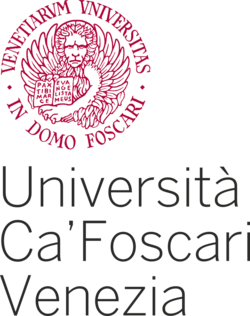 | |
| Formation | 1868 |
| Headquarters | Venice, Italy |
| From the outset conceived as a national rather than a regional institution | |
Ca' Foscari University of Venice (Università Ca' Foscari Venezia) is a public university in Venice, Italy; it is usually known simply as Università Ca' Foscari. Since its foundation in 1868 it has been housed in the Venetian Gothic palace of Ca' Foscari, from which it takes its name. The palace stands on the Grand Canal, between the Rialto and San Marco, in the sestiere of Dorsoduro.
The institute became a university in 1968. It currently has eight departments and almost 21,000 students. It is one of the highest ranked universities in Italy, ranking 5th in 2017 out of 89 universities.[1][2]
History
The institution was founded as the Regia Scuola Superiore di Commercio ("royal high school of commerce") by a Royal Decree dated 6 August 1868, and teaching commenced in December of the same year. The idea of establishing such a school had arisen after the annexation of the Veneto to the new Kingdom of Italy in 1866, and was promoted by three people in particular: the Jewish political economist Luigi Luzzatti, later Prime Minister of Italy; Edoardo Deodati, senator of the Kingdom of Italy and vice-president of the province of Venice; and the Sicilian political economist Francesco Ferrara, director of the school for its first thirty years.
The school was the first institute of higher education in commerce in Italy, and was from the outset conceived as a national rather than a regional institution; it had a diplomatic arm to prepare commercial consular staff for overseas service, and was also a training college for secondary school teachers of commercial subjects. Foreign languages were taught from the start. The school was modelled on the Institut Supérieur de Commerce d'Anvers, founded in 1853 in Antwerp, Belgium.
Following the establishment of a national syllabus for university teaching in 1935, the Istituto Superiore di Economia e Commercio di Venezia, as it was by then called, was authorised to teach and award four-year laurea degrees. In 1968 it obtained university status, and the name was changed to Università degli Studi di Venezia. In the following year two new faculties were created, of industrial chemistry and of philosophy and letters.
Notable alumni
Among the alumni of the university are:
- Giuseppe De'Longhi, businessman
- Enrico Dallavecchia, businessman
- Roberto Meneguzzo, banker and investor
- Renzo Rosso, businessman, founder of the clothing brand Diesel
- Michele Boldrin, economist[3]
- Paolo Costa, economist and politician[4]
- Carlo Carraro, economist and Ca' Foscari's sitting president
- Ugo La Malfa, politician
- Flaminio Piccoli, politician[5]
- Lilli Gruber, politician, author, journalist and TV-personality[6]
- Barbara Frale, historian
- Paul Watzlawick, philosopher and psychologist
- Damiano Michieletto, opera director
- Massimiliano Frani, pianist
Employee on Wikispooks
| Employee | Job | Appointed | End | Description |
|---|---|---|---|---|
| Pasquale Saraceno | Professor in Economics | 1959 | 1970 | Attended Bilderberg/1959. Briefly a Bilderberg Steering committee member. |
Alumni on Wikispooks
| Person | Born | Died | Nationality | Summary | Description |
|---|---|---|---|---|---|
| Lilli Gruber | 19 April 1957 | Italy | Journalist Politician Deep state actor | Multi-Bilderberger Italian journalist. In 2021 she called for mandatory COVID "vaccines". | |
| Ugo La Malfa | 16 May 1903 | 26 March 1979 | Italy | Politician | Italian politician |
References
- ↑ https://www.cafoscarialumni.it/news/ca-foscari-al-nono-posto-nel-ranking-del-sole-24-ore
- ↑ https://www.sostudenti.it/universita/news/migliori-universita-economia-2017-2018-classifica-censis/
- ↑ https://economics.wustl.edu/people/Michele_Boldrin
- ↑ https://www.unive.it/data/persone/5592991/curriculum
- ↑ http://www.treccani.it/enciclopedia/flaminio-piccoli_(Dizionario-Biografico)/
- ↑ http://www.ilgiornale.it/news/gruber-maestra-nel-maltrattare-ospiti-sgraditi-1107933.html%7C
